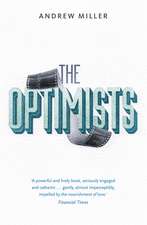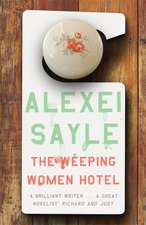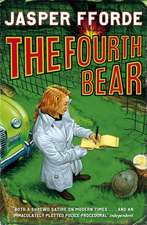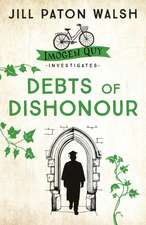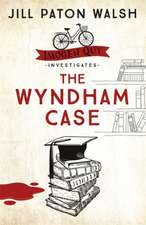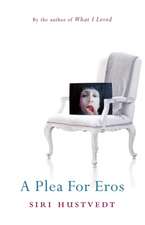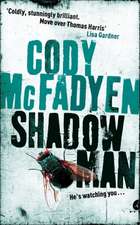Tiger in a Trance
Autor Max Ludingtonen Limba Engleză Paperback – 30 sep 2004
Traveling around the country in his old Volvo following the Dead for over a year, eighteen-year-old Jason Burke discovers how much more lucrative selling acid is than selling T-shirts. Liberally dabbling in his product, his judgment gets cloudier and he starts snorting heroin and sleeping with his supplier’s girlfriend, a green-eyed beauty named Jane. Jason also meets Melanie, a rebellious one-armed high-school girl who’s youthful abandonment leads her deeper into the nomadic world of the Dead. And as his addiction takes hold, Jason reacquaints himself with an old friend of his late father’s who’s near the end of his days. While he struggles with the ghosts of his own past and his exceedingly tenuous future, Jason has to decide where his heart lies and which road will ultimately take him there.
Preț: 110.13 lei
Nou
Puncte Express: 165
Preț estimativ în valută:
21.07€ • 22.00$ • 17.40£
21.07€ • 22.00$ • 17.40£
Carte disponibilă
Livrare economică 25 martie-08 aprilie
Preluare comenzi: 021 569.72.76
Specificații
ISBN-13: 9781400030637
ISBN-10: 1400030633
Pagini: 400
Dimensiuni: 133 x 204 x 22 mm
Greutate: 0.31 kg
Editura: ANCHOR
ISBN-10: 1400030633
Pagini: 400
Dimensiuni: 133 x 204 x 22 mm
Greutate: 0.31 kg
Editura: ANCHOR
Notă biografică
Max Ludington’s fiction has appeared in such publications as Tin House, Nerve, and Meridian. He received his M.F.A. from Columbia University and now lives in New York. Tiger in a Trance is his first novel.
Extras
With the city of vehicles laid out around it, the Hampton Coliseum became the spot, the place where it was happening. The country was full of these hollow cathedrals, kept useful by hockey and basketball games, Promise-Keeper rallies, golf-equipment expositions. Then we came and filled them up for a night or three, made them shine. I was reading Whitman, and thinking of the whole country as holy: every unfurled prairie and oil-stained filling station and filthy city, every mountain range and strip-malled nowhere had its eidolon; but when we gathered for shows it seemed to focus this quality, and the stadiums shimmered like mirages in the rising excitement. Any show might be one of those nights when the crowd and the band got together and hammered out something powerful, joyous, and deeply, if fleetingly, important. The parking lots teemed with old-timers, fledglings, saints, school kids, crazies, metal-heads, jagged-eyed prophets, punks, junkies, ascetics. Why did so many people congregate around a rock band? Put their lives on hold, or make their lives on tour? To have fun, yes. To party and get high and associate with all manner of freaks, sure. But that couldn’t be the crux of the biscuit, as Zappa put it. There was something the music drew from us, and from the ether, and on those nights we became distilled, purified, drunk on it. The drugs and love and sex and craziness were crucial, but it was this lens-like quality of the music, that gathered and focused the inner numen of the land, which drew us back again and again, and created among us a vortex of expectancy, obsession, and ritual.
In the late afternoon, Melanie and I wandered around the lot looking for tickets. There hadn’t been a fall tour because of Jerry’s diabetic coma, and the Dead hadn’t played the East Coast for eight months, so the crowds were big and starved and tickets were scarce. Though among the faces many were familiar, I didn’t see anyone I knew well. Melanie rode on my back for a while, biting my ears and laughing when I screamed, and I liked the feel of her thighs in my hands. Near the stadium we eventually came across a scalper. I hated buying from them, and avoided it on general principle, but we were flush with cash and I didn’t want to worry about tickets the whole time. I talked him down to forty apiece, which still seemed high, and got tickets for all three nights.
We bought two plates of spicy vegetable stir-fry from a couple with a camp-stove behind their van. The guy, a disheveled kid from North Carolina with a sneaky smile that came and went like a lightning strike on his face, asked me if I needed any buds, and I climbed into the van with him to check them out.
The kid pulled out a pre-weighed quarter-ounce and held it out to me. “Here it is, dude.” His wrist was so pale and thin that the round bone on top protruded like a tumor.
I took the bag and unrolled it. I pulled a long bud out and smelled it. It was good sativa, with very few seeds, but I knew I could do better. “Yeah,” I said, not wanting to hurt his feelings. “This is nice, but I’m looking for some indica. Thanks, though, man.”
“What do you mean? This is some good smoke.”
“I know,” I said. “But it’s not what I’m looking for.” I got out of the van, thanked him and his girlfriend for the stir-fry, and we moved on.
We met Judah, a tall, gaunt West-Coast sadhu with masses of bushy brown hair who wore the shell of a giant sea turtle strapped to his back with his belongings inside, and carried a six-foot didjeridoo as a staff. He played it beautifully too, and I remembered hearing its deep eerie throat-song throbbing and echoing through the streets of Berkeley at night. The sound snaked over the buildings and through the alleys, and you could hear it blocks away. Judah came and went in Berkeley like the weather, his travels mysterious, always solitary.
“Hey there, Judah,” I said.
His smile arrived slowly on his sun-browned face, and ruled it completely.
“Brother,” he said. “How are you?”
“I’m well. How are you?”
“Good. Some fine traveling the past few months. Powerful places. Now I’m trying to be serene on the East Coast.”
“That can be tough.” I returned his smile. “This is Melanie.”
Judah looked at her and gave her a deep bow.
“Nice to meet you,” Melanie said.
“Likewise.” He nodded slowly, keeping eye contact with her. “Your missing arm gives you power, but you need to be careful. The power comes from pain, and has to be converted.”
Melanie’s face became serious. “Okay.”
“Go well,” said Judah, and his long legs carried him past us in great strides. The pale green shell bobbed behind him on its leather straps.
“Wow,” said Melanie. “Where do you know him from?”
“The West Coast. From hanging around Berkeley. He’s more of a wanderer than a Deadhead, but he goes to a lot of shows out west. I’ve never seen him on the East Coast before.”
“Wow,” she said again, shaking her head. “We should get some acid for the show tonight.”
“We don’t need to trip tonight. Let’s just find some buds.”
“No. I want to take acid.”
“You sure you want to? It’s your first show.”
“That’s exactly why I need to. To get the full experience.”
“Tripping at a show is one experience,” I said. “Not necessarily the experience.”
But she wanted to trip and there was no talking her out of it. Over the past couple of years I had wearied of acid. My mind had gotten tired of the work it took to get through a trip, and the places the drug took me became less unpredictable. But I couldn’t let her go it alone. So I bought two hits off a guy in the lot whose face I recognized from past tours. Acid was so plentiful and cheap, and so many people I knew trafficked in it, that a couple of hits was something I could usually get for free. I hadn’t bought single hits in the parking lot for years, and it made me feel taken down a notch, socially. The guy recognized me, though, and only charged me two bucks. That made me feel a little better. He swore it was fresh and clean.
“No shit, man,” he said. “The real deal here. Old school stuff. You could go with half apiece if you wanted to.”
Inside, we went to a spot at the back of the floor where I had danced in years past, and where we’d likely meet with friends. I gave her one of the hits, and put the other on my tongue. She did the same with hers. We stood watching the people file in and mill around, smoking joints and bowls and cloves and cigarettes, finding places to stack up their jackets and bags.
“How long till it starts to work?” Melanie asked.
“About half an hour, maybe forty-five minutes,” I said. Then something hit me: “Is this your first trip?”
“Yeah. I thought you knew that.” Her face contracted; she had heard the surprise in my voice.
“No,” I laughed, taken aback, but I quickly paved over my apprehension. I smiled broadly at her. “Oh, boy, are you in for some fun.” I hugged her and kissed her neck. She pulled me in tighter and buried her face in my chest.
The show opened with Hell in a Bucket, Garcia shredding beautifully on the bluesy intro, and we started to dance. Melanie had been to enough hippie-band shows at clubs like the Wetlands in New York, and heard enough Dead bootlegs, to have the dancing down. The acid kicked in around the middle of the set, during West L.A. Fadeaway. The initial rush was clean and muscular and fast. I could tell right away this wouldn’t be an average one-hit trip: it came up behind me like a comet, and I began dancing more fiercely to keep up with it, to maintain a groove and stay on top of the high. If you let the first rush overtake you, it could leave you blinking and confused in its wake and then drag you around hooked to its thrashing tail for the next six or eight hours. You had to climb on top of it from the start, sink your fists in and ride it unafraid—if not in control of it, then at least grafted to it.
By the time the first set ended with Deal, I was riding it like a pro, bouncing around the room’s rafters, conceiving concentric alternate bodies for myself one after the other and letting them burn off in the fireball of the song’s final jam, throwing myself heedlessly forward and around, the music becoming both fuel and vehicle. When the set was over, I looked around for Melanie and saw her swaying toward me in her white T-shirt and jeans. She smiled back at me. When I looked into her eyes I saw that she was tangled in the comet’s tail.
“You okay, baby?” I asked. My voice felt velvety, liquescent and cool in my chest. It made me want to keep speaking. “This is some way-out stuff,” I said, just to feel the sound spreading through me again.
“Yeah.” She nodded uncertainly. “I think I’m okay.”
“Good,” I said. “How about a soda and a smoke.”
“Sure.”
We went off into the hallway crawling with humanity, where the bright yellowish light dripping from above was like a haze, obscuring rather than illuminating the colorful crowd, the rows of salmon-colored metal doors to the outside, the sour-faced beer-and-pretzel wallahs, the cement columns—all of whose real illumination came from within. Standing in line for concessions, a girl behind us lit a clove cigarette. I smelled it and had to have one.
“Oh, god,” I said to her. “We would be very thankful if you could spare one of those cloves.”
“Yeah, sure,” she said. I watched the straight blond hair that curtained her face pendulum as she nodded, like a rack of gold chains in a light breeze. She popped open the red Djarum tin and handed one to me.
I lit it, hearing it crackle softly, and hung the smoke in my mouth for a moment before inhaling it. “Here,” I offered it to Melanie.
“No thanks,” she said. “I’ll have a regular cigarette.”
“No, no.” I shook my head and pushed it closer. “Trust me on this one.”
She took the clove and pulled on it. As she exhaled she moaned, “Oh, yeah. How right you are.”
We passed it back and forth. There’s something about the sharp flavor of a clove that cuts right through you on acid, clearing away the sensational cobwebs and melting the gelid saliva in your mouth and throat. It’s the only time I ever smoked them.
We bought a large Coke and sat against the wall in the arena drinking it and smoking the clove. Melanie wasn’t saying much, but I could tell she was on edge. My own visuals were beginning to go beyond the typical—nothing scary, but rampant melting of colors into each other and trails streaking from anything moving. And red smelled like woodsmoke in my brain.
“Mel, you okay?”
“Yeah,” she nodded. Then she said, “This stuff will wear off, right? I mean, you hear about people never coming down.”
This is one of the bad thoughts. It can quickly become a bottomless well of fear.
“No no no.” I took her face in my hands. “That never happens. You hear me? Never. Just enjoy the high. Five or six hours from now you’ll be the same as ever. Okay?”
“Okay.”
But I could see it wasn’t just that. The drug was taking her places.
“It feels weird,” she said, “not to have an arm. When I was dancing, I kept throwing my right arm this way or that and then being freaked out when it wasn’t there. Back in line I even reached for the clove with my right hand. It’s like it’s really there until I look at it or try to use it, and then it disappears. I feel off-balance... No. What I really feel is what I am: deformed. I gloss over it every day, and now I really feel it. Malformed. Incomplete. Hideous. Oh, fuck. Am I hideous?”
“What? Hideous? Jesus no. You are so beautiful.”
“Thanks for saying that.”
I palmed her neck. “I am not just saying that.”
Her eyes were confused prisms, refracting her mind in slanted, broken beams. I could see her trying, and failing, to reconstruct her cynical veneer.
“Can I tell you something else?” I said. “Without you thinking I’m some kind of weirdo?”
“Too late for that.”
“True.” I was glad she still had her sense of humor.
“Go ahead.”
“I’m not sure I should be telling you this.”
“Just spit it out.”
“Okay.” I put my arm around her, and held the small mound below her right shoulder in my hand. “Your arm kind of turns me on sometimes. Like when we’re making love. Is that too strange?”
“Too strange?” Her eyes widened. She smiled. “No, baby. That’s about the nicest thing you’ve ever said to me.” She pulled me in and we kissed.
“Hey,” came a voice from above. “This is a public place, you know.”
I looked up and saw Cole coming toward us in a white tanktop.
“Where the hell have you been?” he asked.
“New York for a while,” I said. I stood up and hugged him. Somehow his thin body stayed muscular and well-toned, though I was sure he got almost no exercise.
“Man, so you missed the San Fran Civic shows, and the Kaiser shows, huh?”
“Yeah. What about you? You were incognito for a while.”
“I was living down in Tucson with this woman Nora, getting quiet and domestic. I hit tour again last month.”
I reached down and took Melanie’s hand and pulled her upright. “Cole, this is Melanie. It’s her first show.”
“Hey Melanie. Lucky you. Welcome.” He stepped in and gave her a slow hug, the same hug he had given me when he first met me. Then he looked back at me. “Oh wow,” he noticed my eyes and looked from me to Melanie. “You guys are way up there. Acid or Ex?”
“Acid,” I said.
He laughed. “Yeah, school days again. Where are you dancing?”
“Right here.”
Cole was reaching into his small black knapsack. “You should come around to Phil’s side. A bunch of folks are up there.”
“Where are you staying?”
He pulled out a pack of Camel straights and tapped two free. “Comfort Inn.” He gave one to me and lipped the other. “Got a light?”
“Yeah. Us too.” I lit his cigarette, the scrape and puff of the lighter vivid in my ears, then brought the flame to mine. The past felt glossed over. I knew I’d have to ask him about Dawn eventually, but I couldn’t help being glad to see him. Cole was an institution on tour, and I had spent so long being proud to count him as a friend that it was hard to think of him any other way. I told him we’d see him up on Phil’s side, and he took off.
Before the second set started Melanie got restless. “Come on,” I said. “I’ll show you around.” We took a stroll in the hallway. Near the back of the stage, we ran into an Om circle—thirty or so people locked together with arms over shoulders or around waists, swaying and chanting long Oms toward some focal point, their eyes closed. The sound made waves in the ether that brushed against my face. Melanie didn’t say anything. We just stood watching. Now and then someone would tap a couple of people on the shoulder, and the circle would part to allow them to join. Billy and Lamar, two West-Coasters I knew, were walking past the circle in front of us, and stopped to check out a girl’s ass-crack, an inch or so of which was visible above the top of her sagging drawstring skirt. They were smiling; Billy had a nose like a pickax, and a sharp hooked smile to match it. He reached forward and tugged on the girl’s skirt. Another two inches of crack came into view. He and Lamar reared back and laughed silently. The girl was immersed in the chant, and didn’t notice. After a second, Billy stepped up and slowly tugged the skirt down again, this time exposing most of the girl’s ass. It took her a second to register the breeze and reach behind her. She pulled the skirt up and looked back over her shoulder. When she saw Billy standing there, he laughed aloud, a little sheepishly, and held out his hands in a gesture of helplessness that blamed the whole thing on the beauty of her ass. The girl smiled at him and shook her head.
“Nice move, Billy,” I called to him as he and Lamar walked past.
Both of them laughed and waved at me, but didn’t stop.
“You know those guys?” Melanie asked.
“Yeah. They’re friends from out west.”
“They better not try that shit on me.”
I laughed. “Don’t worry. Billy’s cool. His name’s not even really Billy.”
“What is it?”
“I’m not sure. I just know he’s got old warrants or something. He calls himself Billy Genovese, like the mob family. But that’s not his real name.”
In fact I did know Billy’s name. It was George Mandanopoulos, but I was sworn to secrecy. There were a lot of these marginal fugitives on tour, who changed their names or used more than one. Like Riff, whose ID gave his name as Henry Winkler; or Daniel, who went by Chuck—his mother had played the mother of a boy named Chuck in an old TV sitcom. If you could get enough people to start calling you something, that’s who you were. And the Dead’s arcana offered a deep well of fake names too. People were always registering at hotels under names like Jack Straw, Billy DeLyon, August West, and Delilah Jones.
As we were watching the Om circle, the lights fell and the band went into Sugar Magnolia. The circle disintegrated, the chanters drifting off like sky divers breaking formation to pull their chutes. The hallway began to clear out, and I headed for one of the openings. Melanie pulled me back.
“It’s nicer out here,” she said. “Let’s stay out here for a minute. More to look at.”
“Fine.” I didn’t mind at all. Sugar Mag didn’t excite me much. I preferred edgier or more freeform second-set tunes. We started walking again, holding hands. I could feel the erratic pulse of Melanie’s mind through her sweaty hand. I looked at her now and then, but she was spacing out on the crowd, trying to be free of herself. The hallway was where a lot of the wilder dancers plied their trades, and we saw them running, swirling, arched over backward, as we moved.
“What are they doing?” Melanie asked, pointing at a loose cluster of people all spinning in place like dervishes, skirts and shirts and robes billowing around them, eyes closed.
“Those are the spinners,” I said. “They always do that.”
“Why?”
“I don’t know. Some kind of trance thing. They have a meditative experience or something. They never seem to get dizzy.”
We watched the spinners for a while. Their movements made them blurs, and they infused the light around them with the bleeding colors of their clothing. Some held their arms flung outward, and some clasped them to their chests or pulled them through intricate contortions in front of closed eyes. All maintained worshipful silence during the pauses between songs.
The Boys went into Scarlet Begonias, and I dragged Melanie through the opening nearest us. We were up on Phil’s side, the left side of the stage, right where Cole and the others were dancing. Phil’s side was usually the spot, since Jerry’s side tended to get more crowded with locals. Saul was there, and Carolina Liz, and Dread Jim, who had cut off his dreads a year earlier. The only dreads in sight were Anthony’s, which draped to his beltline; he tossed them around like some medieval weapon when he danced, and had to be given wide berth. Nothing worse than closing your eyes, leaning in to commune with one of the band’s crescendos, and catching a faceful of prickly dreadlocks.
From the Hardcover edition.
In the late afternoon, Melanie and I wandered around the lot looking for tickets. There hadn’t been a fall tour because of Jerry’s diabetic coma, and the Dead hadn’t played the East Coast for eight months, so the crowds were big and starved and tickets were scarce. Though among the faces many were familiar, I didn’t see anyone I knew well. Melanie rode on my back for a while, biting my ears and laughing when I screamed, and I liked the feel of her thighs in my hands. Near the stadium we eventually came across a scalper. I hated buying from them, and avoided it on general principle, but we were flush with cash and I didn’t want to worry about tickets the whole time. I talked him down to forty apiece, which still seemed high, and got tickets for all three nights.
We bought two plates of spicy vegetable stir-fry from a couple with a camp-stove behind their van. The guy, a disheveled kid from North Carolina with a sneaky smile that came and went like a lightning strike on his face, asked me if I needed any buds, and I climbed into the van with him to check them out.
The kid pulled out a pre-weighed quarter-ounce and held it out to me. “Here it is, dude.” His wrist was so pale and thin that the round bone on top protruded like a tumor.
I took the bag and unrolled it. I pulled a long bud out and smelled it. It was good sativa, with very few seeds, but I knew I could do better. “Yeah,” I said, not wanting to hurt his feelings. “This is nice, but I’m looking for some indica. Thanks, though, man.”
“What do you mean? This is some good smoke.”
“I know,” I said. “But it’s not what I’m looking for.” I got out of the van, thanked him and his girlfriend for the stir-fry, and we moved on.
We met Judah, a tall, gaunt West-Coast sadhu with masses of bushy brown hair who wore the shell of a giant sea turtle strapped to his back with his belongings inside, and carried a six-foot didjeridoo as a staff. He played it beautifully too, and I remembered hearing its deep eerie throat-song throbbing and echoing through the streets of Berkeley at night. The sound snaked over the buildings and through the alleys, and you could hear it blocks away. Judah came and went in Berkeley like the weather, his travels mysterious, always solitary.
“Hey there, Judah,” I said.
His smile arrived slowly on his sun-browned face, and ruled it completely.
“Brother,” he said. “How are you?”
“I’m well. How are you?”
“Good. Some fine traveling the past few months. Powerful places. Now I’m trying to be serene on the East Coast.”
“That can be tough.” I returned his smile. “This is Melanie.”
Judah looked at her and gave her a deep bow.
“Nice to meet you,” Melanie said.
“Likewise.” He nodded slowly, keeping eye contact with her. “Your missing arm gives you power, but you need to be careful. The power comes from pain, and has to be converted.”
Melanie’s face became serious. “Okay.”
“Go well,” said Judah, and his long legs carried him past us in great strides. The pale green shell bobbed behind him on its leather straps.
“Wow,” said Melanie. “Where do you know him from?”
“The West Coast. From hanging around Berkeley. He’s more of a wanderer than a Deadhead, but he goes to a lot of shows out west. I’ve never seen him on the East Coast before.”
“Wow,” she said again, shaking her head. “We should get some acid for the show tonight.”
“We don’t need to trip tonight. Let’s just find some buds.”
“No. I want to take acid.”
“You sure you want to? It’s your first show.”
“That’s exactly why I need to. To get the full experience.”
“Tripping at a show is one experience,” I said. “Not necessarily the experience.”
But she wanted to trip and there was no talking her out of it. Over the past couple of years I had wearied of acid. My mind had gotten tired of the work it took to get through a trip, and the places the drug took me became less unpredictable. But I couldn’t let her go it alone. So I bought two hits off a guy in the lot whose face I recognized from past tours. Acid was so plentiful and cheap, and so many people I knew trafficked in it, that a couple of hits was something I could usually get for free. I hadn’t bought single hits in the parking lot for years, and it made me feel taken down a notch, socially. The guy recognized me, though, and only charged me two bucks. That made me feel a little better. He swore it was fresh and clean.
“No shit, man,” he said. “The real deal here. Old school stuff. You could go with half apiece if you wanted to.”
Inside, we went to a spot at the back of the floor where I had danced in years past, and where we’d likely meet with friends. I gave her one of the hits, and put the other on my tongue. She did the same with hers. We stood watching the people file in and mill around, smoking joints and bowls and cloves and cigarettes, finding places to stack up their jackets and bags.
“How long till it starts to work?” Melanie asked.
“About half an hour, maybe forty-five minutes,” I said. Then something hit me: “Is this your first trip?”
“Yeah. I thought you knew that.” Her face contracted; she had heard the surprise in my voice.
“No,” I laughed, taken aback, but I quickly paved over my apprehension. I smiled broadly at her. “Oh, boy, are you in for some fun.” I hugged her and kissed her neck. She pulled me in tighter and buried her face in my chest.
The show opened with Hell in a Bucket, Garcia shredding beautifully on the bluesy intro, and we started to dance. Melanie had been to enough hippie-band shows at clubs like the Wetlands in New York, and heard enough Dead bootlegs, to have the dancing down. The acid kicked in around the middle of the set, during West L.A. Fadeaway. The initial rush was clean and muscular and fast. I could tell right away this wouldn’t be an average one-hit trip: it came up behind me like a comet, and I began dancing more fiercely to keep up with it, to maintain a groove and stay on top of the high. If you let the first rush overtake you, it could leave you blinking and confused in its wake and then drag you around hooked to its thrashing tail for the next six or eight hours. You had to climb on top of it from the start, sink your fists in and ride it unafraid—if not in control of it, then at least grafted to it.
By the time the first set ended with Deal, I was riding it like a pro, bouncing around the room’s rafters, conceiving concentric alternate bodies for myself one after the other and letting them burn off in the fireball of the song’s final jam, throwing myself heedlessly forward and around, the music becoming both fuel and vehicle. When the set was over, I looked around for Melanie and saw her swaying toward me in her white T-shirt and jeans. She smiled back at me. When I looked into her eyes I saw that she was tangled in the comet’s tail.
“You okay, baby?” I asked. My voice felt velvety, liquescent and cool in my chest. It made me want to keep speaking. “This is some way-out stuff,” I said, just to feel the sound spreading through me again.
“Yeah.” She nodded uncertainly. “I think I’m okay.”
“Good,” I said. “How about a soda and a smoke.”
“Sure.”
We went off into the hallway crawling with humanity, where the bright yellowish light dripping from above was like a haze, obscuring rather than illuminating the colorful crowd, the rows of salmon-colored metal doors to the outside, the sour-faced beer-and-pretzel wallahs, the cement columns—all of whose real illumination came from within. Standing in line for concessions, a girl behind us lit a clove cigarette. I smelled it and had to have one.
“Oh, god,” I said to her. “We would be very thankful if you could spare one of those cloves.”
“Yeah, sure,” she said. I watched the straight blond hair that curtained her face pendulum as she nodded, like a rack of gold chains in a light breeze. She popped open the red Djarum tin and handed one to me.
I lit it, hearing it crackle softly, and hung the smoke in my mouth for a moment before inhaling it. “Here,” I offered it to Melanie.
“No thanks,” she said. “I’ll have a regular cigarette.”
“No, no.” I shook my head and pushed it closer. “Trust me on this one.”
She took the clove and pulled on it. As she exhaled she moaned, “Oh, yeah. How right you are.”
We passed it back and forth. There’s something about the sharp flavor of a clove that cuts right through you on acid, clearing away the sensational cobwebs and melting the gelid saliva in your mouth and throat. It’s the only time I ever smoked them.
We bought a large Coke and sat against the wall in the arena drinking it and smoking the clove. Melanie wasn’t saying much, but I could tell she was on edge. My own visuals were beginning to go beyond the typical—nothing scary, but rampant melting of colors into each other and trails streaking from anything moving. And red smelled like woodsmoke in my brain.
“Mel, you okay?”
“Yeah,” she nodded. Then she said, “This stuff will wear off, right? I mean, you hear about people never coming down.”
This is one of the bad thoughts. It can quickly become a bottomless well of fear.
“No no no.” I took her face in my hands. “That never happens. You hear me? Never. Just enjoy the high. Five or six hours from now you’ll be the same as ever. Okay?”
“Okay.”
But I could see it wasn’t just that. The drug was taking her places.
“It feels weird,” she said, “not to have an arm. When I was dancing, I kept throwing my right arm this way or that and then being freaked out when it wasn’t there. Back in line I even reached for the clove with my right hand. It’s like it’s really there until I look at it or try to use it, and then it disappears. I feel off-balance... No. What I really feel is what I am: deformed. I gloss over it every day, and now I really feel it. Malformed. Incomplete. Hideous. Oh, fuck. Am I hideous?”
“What? Hideous? Jesus no. You are so beautiful.”
“Thanks for saying that.”
I palmed her neck. “I am not just saying that.”
Her eyes were confused prisms, refracting her mind in slanted, broken beams. I could see her trying, and failing, to reconstruct her cynical veneer.
“Can I tell you something else?” I said. “Without you thinking I’m some kind of weirdo?”
“Too late for that.”
“True.” I was glad she still had her sense of humor.
“Go ahead.”
“I’m not sure I should be telling you this.”
“Just spit it out.”
“Okay.” I put my arm around her, and held the small mound below her right shoulder in my hand. “Your arm kind of turns me on sometimes. Like when we’re making love. Is that too strange?”
“Too strange?” Her eyes widened. She smiled. “No, baby. That’s about the nicest thing you’ve ever said to me.” She pulled me in and we kissed.
“Hey,” came a voice from above. “This is a public place, you know.”
I looked up and saw Cole coming toward us in a white tanktop.
“Where the hell have you been?” he asked.
“New York for a while,” I said. I stood up and hugged him. Somehow his thin body stayed muscular and well-toned, though I was sure he got almost no exercise.
“Man, so you missed the San Fran Civic shows, and the Kaiser shows, huh?”
“Yeah. What about you? You were incognito for a while.”
“I was living down in Tucson with this woman Nora, getting quiet and domestic. I hit tour again last month.”
I reached down and took Melanie’s hand and pulled her upright. “Cole, this is Melanie. It’s her first show.”
“Hey Melanie. Lucky you. Welcome.” He stepped in and gave her a slow hug, the same hug he had given me when he first met me. Then he looked back at me. “Oh wow,” he noticed my eyes and looked from me to Melanie. “You guys are way up there. Acid or Ex?”
“Acid,” I said.
He laughed. “Yeah, school days again. Where are you dancing?”
“Right here.”
Cole was reaching into his small black knapsack. “You should come around to Phil’s side. A bunch of folks are up there.”
“Where are you staying?”
He pulled out a pack of Camel straights and tapped two free. “Comfort Inn.” He gave one to me and lipped the other. “Got a light?”
“Yeah. Us too.” I lit his cigarette, the scrape and puff of the lighter vivid in my ears, then brought the flame to mine. The past felt glossed over. I knew I’d have to ask him about Dawn eventually, but I couldn’t help being glad to see him. Cole was an institution on tour, and I had spent so long being proud to count him as a friend that it was hard to think of him any other way. I told him we’d see him up on Phil’s side, and he took off.
Before the second set started Melanie got restless. “Come on,” I said. “I’ll show you around.” We took a stroll in the hallway. Near the back of the stage, we ran into an Om circle—thirty or so people locked together with arms over shoulders or around waists, swaying and chanting long Oms toward some focal point, their eyes closed. The sound made waves in the ether that brushed against my face. Melanie didn’t say anything. We just stood watching. Now and then someone would tap a couple of people on the shoulder, and the circle would part to allow them to join. Billy and Lamar, two West-Coasters I knew, were walking past the circle in front of us, and stopped to check out a girl’s ass-crack, an inch or so of which was visible above the top of her sagging drawstring skirt. They were smiling; Billy had a nose like a pickax, and a sharp hooked smile to match it. He reached forward and tugged on the girl’s skirt. Another two inches of crack came into view. He and Lamar reared back and laughed silently. The girl was immersed in the chant, and didn’t notice. After a second, Billy stepped up and slowly tugged the skirt down again, this time exposing most of the girl’s ass. It took her a second to register the breeze and reach behind her. She pulled the skirt up and looked back over her shoulder. When she saw Billy standing there, he laughed aloud, a little sheepishly, and held out his hands in a gesture of helplessness that blamed the whole thing on the beauty of her ass. The girl smiled at him and shook her head.
“Nice move, Billy,” I called to him as he and Lamar walked past.
Both of them laughed and waved at me, but didn’t stop.
“You know those guys?” Melanie asked.
“Yeah. They’re friends from out west.”
“They better not try that shit on me.”
I laughed. “Don’t worry. Billy’s cool. His name’s not even really Billy.”
“What is it?”
“I’m not sure. I just know he’s got old warrants or something. He calls himself Billy Genovese, like the mob family. But that’s not his real name.”
In fact I did know Billy’s name. It was George Mandanopoulos, but I was sworn to secrecy. There were a lot of these marginal fugitives on tour, who changed their names or used more than one. Like Riff, whose ID gave his name as Henry Winkler; or Daniel, who went by Chuck—his mother had played the mother of a boy named Chuck in an old TV sitcom. If you could get enough people to start calling you something, that’s who you were. And the Dead’s arcana offered a deep well of fake names too. People were always registering at hotels under names like Jack Straw, Billy DeLyon, August West, and Delilah Jones.
As we were watching the Om circle, the lights fell and the band went into Sugar Magnolia. The circle disintegrated, the chanters drifting off like sky divers breaking formation to pull their chutes. The hallway began to clear out, and I headed for one of the openings. Melanie pulled me back.
“It’s nicer out here,” she said. “Let’s stay out here for a minute. More to look at.”
“Fine.” I didn’t mind at all. Sugar Mag didn’t excite me much. I preferred edgier or more freeform second-set tunes. We started walking again, holding hands. I could feel the erratic pulse of Melanie’s mind through her sweaty hand. I looked at her now and then, but she was spacing out on the crowd, trying to be free of herself. The hallway was where a lot of the wilder dancers plied their trades, and we saw them running, swirling, arched over backward, as we moved.
“What are they doing?” Melanie asked, pointing at a loose cluster of people all spinning in place like dervishes, skirts and shirts and robes billowing around them, eyes closed.
“Those are the spinners,” I said. “They always do that.”
“Why?”
“I don’t know. Some kind of trance thing. They have a meditative experience or something. They never seem to get dizzy.”
We watched the spinners for a while. Their movements made them blurs, and they infused the light around them with the bleeding colors of their clothing. Some held their arms flung outward, and some clasped them to their chests or pulled them through intricate contortions in front of closed eyes. All maintained worshipful silence during the pauses between songs.
The Boys went into Scarlet Begonias, and I dragged Melanie through the opening nearest us. We were up on Phil’s side, the left side of the stage, right where Cole and the others were dancing. Phil’s side was usually the spot, since Jerry’s side tended to get more crowded with locals. Saul was there, and Carolina Liz, and Dread Jim, who had cut off his dreads a year earlier. The only dreads in sight were Anthony’s, which draped to his beltline; he tossed them around like some medieval weapon when he danced, and had to be given wide berth. Nothing worse than closing your eyes, leaning in to commune with one of the band’s crescendos, and catching a faceful of prickly dreadlocks.
From the Hardcover edition.
Recenzii
“Riveting. . . . A euphoric ode to misspent youth.” –Los Angeles Times
“Youthful, reckless, and just plain fun. . . . As compelling and contradictory as the band itself.” –San Francisco Chronicle
“The latest incarnation of an American character passed down from Walt Whitman to Jack Kerouac: the soulful rebel with an enormous appetite for life.” –New York Times Book Review
“[An] excellent debut novel. . . . Tiger in a Trance is a crisply told and consuming coming-of-age tale. . . . This is a book worth reading whether you've seen the band at Red Rocks or not. Four stars.” –Rolling Stone
“Smart and lyrical. . . . Ludington gives us an introspective, Deadhead’s eye-view of how the band helped its followers tap into the deeper yearnings of American culture.” –Raleigh News and Observer
“Lucid and powerful . . . Tiger in a Trance seems destined to be a kind of classic. No one has gotten closer to the beauty and loneliness of the drug culture, where everything, finally, is about coming down.” –New York Magazine
“[A] startlingly good debut. . . . Few writers have managed more clearheaded descriptions of getting high–or coming down. . . . Marvel at Ludington’s ferocious command of character and Americana. Grade: A.” –Entertainment Weekly
“A gripping and astonishing On-the Road first novel that in both subject and execution can be compared to the best of both Kerouac and Kesey.” –George Plimpton
“[A] great accomplishment . . . engrossing reading. . . . Ludington has given us an update of On the Road.” –Boston Herald
“The Grateful Dead have been the backdrop of many novels, but Tiger in a Trance is the first one to portray the lives of the Deadheads themselves. The dialogue is fantastic–sharp, economical, and authentic. . . . Excellent.” –Jim Carroll, author of The Basketball Diaries
“[An] entertaining first novel.” –New York Times
“[Ludington writes] with deft, economical prose and [has] a wonderful ear for dialogue that would make Hemingway proud.” –Chico News and Reviews
“Echoes of Kesey, Kerouac, and Alex Garland waft like pot smoke through this first novel.” –Men’s Journal
“Max Ludington is an obviously accomplished and promising writer. His style is graceful, his characters are alive, and he can tell a story. As a generational novel, Tiger in a Trance reminded me of The Sun Also Rises.” –Philip Caputo, author of Horn of Africa and A Rumor of War
“[Ludington] manages to capture the darker underbelly of the world of the Deadhead. . . . At first romanticiz[ing] the open road, the thrill turns ugly and the novel starts to read more like William Burroughs than Jack Kerouac. It’s a good trip.” –Hartford Advocate
“Youthful, reckless, and just plain fun. . . . As compelling and contradictory as the band itself.” –San Francisco Chronicle
“The latest incarnation of an American character passed down from Walt Whitman to Jack Kerouac: the soulful rebel with an enormous appetite for life.” –New York Times Book Review
“[An] excellent debut novel. . . . Tiger in a Trance is a crisply told and consuming coming-of-age tale. . . . This is a book worth reading whether you've seen the band at Red Rocks or not. Four stars.” –Rolling Stone
“Smart and lyrical. . . . Ludington gives us an introspective, Deadhead’s eye-view of how the band helped its followers tap into the deeper yearnings of American culture.” –Raleigh News and Observer
“Lucid and powerful . . . Tiger in a Trance seems destined to be a kind of classic. No one has gotten closer to the beauty and loneliness of the drug culture, where everything, finally, is about coming down.” –New York Magazine
“[A] startlingly good debut. . . . Few writers have managed more clearheaded descriptions of getting high–or coming down. . . . Marvel at Ludington’s ferocious command of character and Americana. Grade: A.” –Entertainment Weekly
“A gripping and astonishing On-the Road first novel that in both subject and execution can be compared to the best of both Kerouac and Kesey.” –George Plimpton
“[A] great accomplishment . . . engrossing reading. . . . Ludington has given us an update of On the Road.” –Boston Herald
“The Grateful Dead have been the backdrop of many novels, but Tiger in a Trance is the first one to portray the lives of the Deadheads themselves. The dialogue is fantastic–sharp, economical, and authentic. . . . Excellent.” –Jim Carroll, author of The Basketball Diaries
“[An] entertaining first novel.” –New York Times
“[Ludington writes] with deft, economical prose and [has] a wonderful ear for dialogue that would make Hemingway proud.” –Chico News and Reviews
“Echoes of Kesey, Kerouac, and Alex Garland waft like pot smoke through this first novel.” –Men’s Journal
“Max Ludington is an obviously accomplished and promising writer. His style is graceful, his characters are alive, and he can tell a story. As a generational novel, Tiger in a Trance reminded me of The Sun Also Rises.” –Philip Caputo, author of Horn of Africa and A Rumor of War
“[Ludington] manages to capture the darker underbelly of the world of the Deadhead. . . . At first romanticiz[ing] the open road, the thrill turns ugly and the novel starts to read more like William Burroughs than Jack Kerouac. It’s a good trip.” –Hartford Advocate
Descriere
RThe Grateful Dead's unique partnership with Dead Heads generated not only devotion but artistic inspiration--and "Tiger In A Trance" is the finest literary sample of that creativity. It is a brilliant novel of life in the world of one subgroup of Dead Heads.S--Dennis McNally, author of "A Long Strange Trip: The Inside History of the Grateful Dead."

